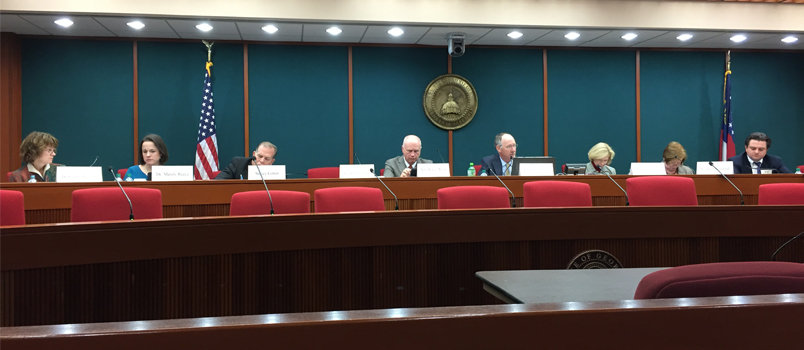 The Georgia Commission on Medical Cannabis hears testimonies Dec. 9 on a bill allowing medical marijuana to be grown in the state. Georgia Baptist Convention leaders opposed the measure, which was ultimately voted down. GERALD HARRIS/Index
The Georgia Commission on Medical Cannabis hears testimonies Dec. 9 on a bill allowing medical marijuana to be grown in the state. Georgia Baptist Convention leaders opposed the measure, which was ultimately voted down. GERALD HARRIS/IndexATLANTA — The Georgia Commission on Medical Cannabis, a blue-ribbon study panel appointed by Governor Nathan Deal, met on Dec. 9 and by a 9 to 5 vote rejected Representative Allen Peake’s push to allow medical marijuana to be grown in Georgia.
A bill to legalize the use of medical marijuana (cannabis) was passed by the legislature last March and signed into law by Governor Deal in April. Scores of families in Georgia are now using the cannabis oil for medicinal purposes. So, the effort to pass a bill to grow marijuana in Georgia is perceived by some to be a subtle move toward the legalization of marijuana for recreational purposes.
Mike Griffin, who works as the Georgia Baptist public policy advocate under the Gold Dome, was present to testify on behalf of Georgia Baptists and affirm the resolution the Convention passed in November on “The Dangers of Marijuana.”
While stating that Georgia Baptists have never gone on record as opposing medical marijuana in a controlled environment, Griffin explained, “The consequences of allowing marijuana to be grown in Georgia does create a difficult law enforcement challenge and it does put the state a step closer to the legalization of recreational use. For the sake of all our children and families in Georgia, this is a risk too great!”
Peake had arranged for two families with children suffering from severe physical ailments to be present. The fathers of the children spoke in favor of growing the marijuana in Georgia. All those present were touched by the physical challenges of the children and the pathos in the resonating in the voices of the fathers.
... the effort to pass a bill to grow marijuana in Georgia is perceived by some to be a subtle move toward the legalization of marijuana for recreational purposes.
In response to parents using medical marijuana to help their children with their afflictions, Griffin stated, “Not enough can be said for the love and dedication of parents and others who are doing everything in their power to find the most effective medical treatment for their family and friends.
“Having observed first hand many sincere people fighting for the legalization of medical marijuana, it would be hard for me to believe that these families are doing what they are doing because their ultimate goal is to make recreational marijuana legal. Furthermore, I think that it would be wrong and a gross mischaracterization to say that just because someone is in favor of medical marijuana that they are also in favor of the legalization of recreational marijuana.
“However, on the other hand I also believe that it is a gross mischaracterization to say that if someone is against the legalization of drugs not approved by the Food and Drug Administration of the cultivation of an illegal plant like marijuana they are against children and adults seeking help in dealing with their pain and suffering.”
Governor Deal has stated he is against growing marijuana in Georgia, because he is not convinced the state could control the use of the plant. The Georgia Sherriff’s Association made it clear to the commission they are opposed to growing any kind of marijuana for any purpose in the state.
Agriculture Commissioner Gary Black has voiced his opposition to growing marijuana in Georgia as well. He has indicated that growing the plant in Georgia puts his department in an untenable situation, because of their responsibility to do seed testing and enforce laws concerning approved pesticides to commercial crops. Since marijuana is illegal from a federal standpoint, there is no federally approved pesticide for this crop.
There are multiple reasons for not growing marijuana in Georgia. In fact, if the growth of the plant were ever approved it would be based on emotion, not facts. Some may say that those who oppose growing this drug are not loving, but Virginia Galloway, regional field director for the Faith and Freedom Coalition, wrote, “To say that you don’t love people if you’re not for medical marijuana is like a petulant teenager claiming her Dad doesn’t love her if he doesn’t allow her to go to a drinking party.
“One could argue that it’s not love to use children for guinea pigs in an informal drug experiment with an unspecified potency in an uncontrolled environment.
“It’s not loving to give a child any substance that has been proven to interfere with brain development.
“It’s not loving to put law enforcement in a quandary like making a choice to enforce federal law or state laws.
“It’s not loving to put desperate parents at risk of losing their children to DFACS because they have a Schedule 1 drug in their possession or losing their car, cash, and other possession to civil forfeiture.
“It’s not loving to give parents false hope that a drug will work for their child, when sometimes the drug has been known to make the condition worse.
“No one wants to see sick people suffer, but legislators should weigh the societal costs of legalizing mind-altering drugs that have led to the destruction of many lives.”
After a morning-long discussion and conflicting testimonies the Commission voted the proposal to grow marijuana in Georgia down in a 9 to 5 decision. The commission also voted to urge Georgia’s congressional delegation to push to change federal law that prohibits growing marijuana or taking it across state lines.
So, the battle is not over. Those who oppose growing marijuana in the state won round 1, but though that battle is won the war seems to never be over.